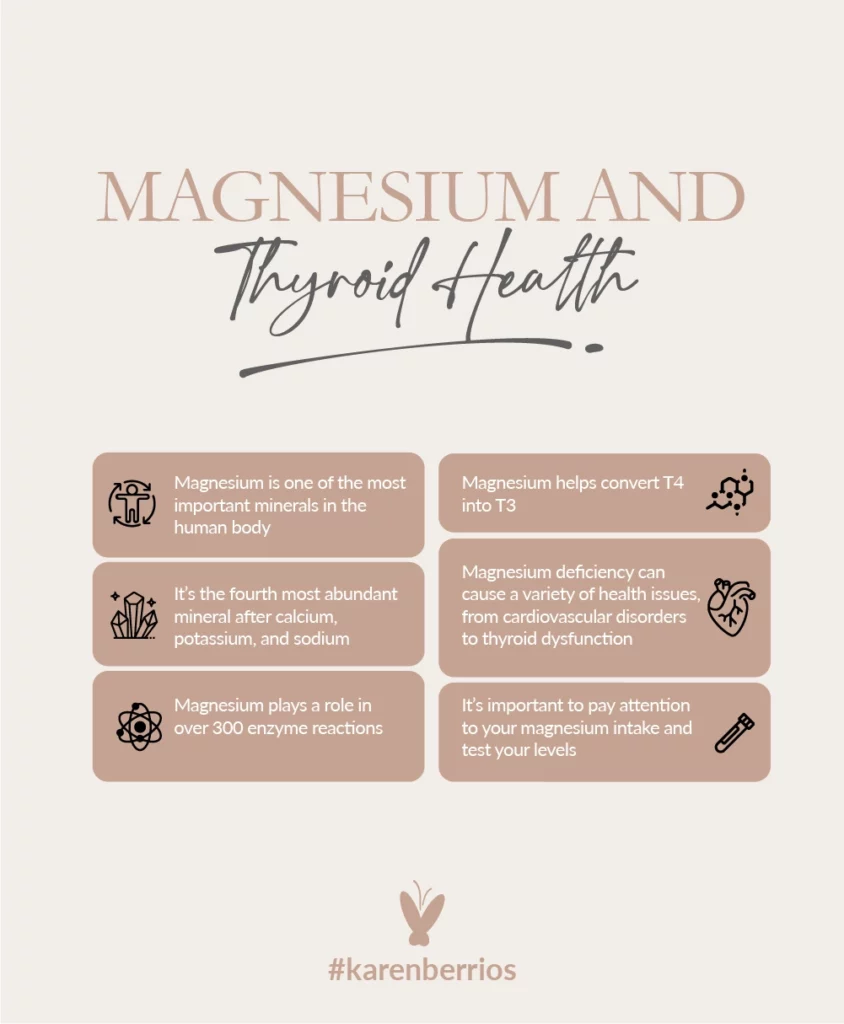

Magnesium and Thyroid Health
Vitamins and minerals are incredibly important for the optimal function of all of our body systems and it’s only when we’re deficient that we actually realize and understand their role. We intake them through our food, but also dietary supplements as most of us can’t get adequate amounts just through our meals.
Unfortunately, the food we eat today, no matter how organic or local it is, isn’t as nutrient-rich as it once was. Our soil is severely depleted of nutrients, making fruit and vegetables grow with fewer minerals and vitamins. Consequently, no matter how bioavailable they are, our bodies intake fewer micronutrients from the same food than merely 20 years ago. Modern agriculture and aggressive methods used to work the land are stripping off essential nutrients, and it’s not looking like it’s going to get any better in the near future.
That’s where dietary supplements come in, helping you maintain optimal amounts of micronutrients in your system that will help balance out your hormones, promote healthy digestion, optimize your immune system, and prevent disease. One of the most important micronutrients out there is magnesium, and magnesium deficiency is one of the conditions that really starts showing side effects that are hard to go unnoticed.
Magnesium 101
This important mineral plays a role in over 300 enzyme systems in the human body, helping convert food into energy, regulate muscle and nerve function, balance blood pressure, and keep your blood sugar levels low. It’s also responsible for the synthesis of protein, RNA, DNA, and glutathione (an important antioxidant). Magnesium also helps transport calcium and potassium across cells, as well as promote healthy thyroid function.
The recommended dietary allowance (RDA) of magnesium is 400 mg for men between 19 and 30 years of age, while for women it’s 310 mg. For those older than 30, the numbers increase slightly and they’re 420 mg for men and 320 mg for women. Still, these numbers are just a set point. If you’re living an active lifestyle, having a stressful job, or having issues with sleep, you might need more than just the recommended dose.
Sources of Magnesium
Magnesium is naturally present in some foods, added to beverages, and found pure in dietary supplements.
Food sources of magnesium include:
- Pumpkin seeds
- Chia seeds
- Almonds
- Spinach
- Cashews
- Peanuts
- Edamame
- Soy milk
- Black beans
- Peanut butter
Additionally, there are now plenty of different foods and beverages that have been fortified with magnesium, as a means to help reduce the number of magnesium deficiencies throughout the globe. Unfortunately, most of these products have other artificially added ingredients in there, making them potentially unhealthy and not the best choice for your daily diet.
Magnesium Deficiency
It seems that many people struggle with magnesium deficiency these days, most times without even knowing that’s the reason for the health issues they’re experiencing. The symptoms of magnesium deficiency are incredibly abstract, with the ability to represent a wide array of health issues. Some of the most common symptoms include:
- Inexplicable fatigue
- Muscle cramps and spasms
- Low levels of bone density and the onset of osteoporosis
- High blood pressure
- Heart irregularities
If left untreated, these symptoms can worsen over time and cause numbness and tingling in your arms and legs, mood swings and personality changes, abnormal and irregular heart rhythms, and even seizures.
Magnesium and the Thyroid
The health of your thyroid gland affects a variety of other body systems, so when your thyroid function is impaired, a myriad of other health issues follow.
Magnesium has a role in converting T4 thyroid hormone into its active version, T3, and
studies show how magnesium deficiency can cause abnormal thyroid function. Luckily, it seems that it can easily be reversed through proper magnesium supplementation.
People diagnosed with an autoimmune disease very often have low magnesium levels. Hashimoto’s thyroiditis is one of them, with studies showing how it may even be triggered by a magnesium deficiency, due to the elevation of your thyroid antibodies.
Magnesium deficiency may be directly affecting the thyroid hormones and with it, the function of your thyroid gland, but it’s mostly through other disorders it’s linked to that it’s even more severely affected.
Other Important Magnesium Roles
After calcium, potassium, and sodium, magnesium is the fourth most abundant mineral in the human body, with a plethora of important functions. Here are some you might even already be familiar with.
Magnesium and Sleep
One of the most important roles of magnesium is that it helps improve your sleep quality. Magnesium helps your body relax and stimulates the parasympathetic nervous system, also known as your rest and digest mode. You can also use it in parallel with melatonin, which will help you fall asleep faster and sleep longer in duration.
Studies show how magnesium supplementation of 500 mg daily improves sleep efficiency as well as increases the concentrations of melatonin, cortisol, and renin, helping your body balance its hormones.
Magnesium and Muscles
Most active people increase their magnesium intake due to its role in regulating muscle contractions and reducing soreness. In your muscles, magnesium acts as a calcium blocker, helping them relax instead of contract. That’s why, if you’re struggling with magnesium deficiency, you’ll most likely experience muscle cramps and spasms.

Magnesium and Headaches
One of the symptoms of an underactive thyroid or hypothyroidism are frequent headaches. Some studies have found that migraines are more often in people with lower magnesium levels, leading to a conclusion that optimal magnesium intake prevents or at least reduces the risk of developing migraines.
Magnesium and Blood Pressure
Many people struggle with high blood pressure or hypertension, and studies show a powerful link between magnesium supplementation and lowering your blood pressure levels. After only one month of consistent supplementation, there was a drastic improvement in blood pressure levels.
The Takeaway
Magnesium is an incredibly important mineral with a plethora of important roles in the human body. From regulating blood pressure and blood sugar levels to improving sleep efficiency and promoting protein synthesis, having optimal magnesium levels should be something we all need to focus on.
Consequently, low magnesium levels can have a negative impact on all of these systems as well as the thyroid, leading to inflammation, thyroid dysfunction, and potentially even thyroid disease. Include a variety of magnesium-rich foods into your diet and test your magnesium levels so you can properly supplement if necessary.
The most common symptoms of magnesium deficiency are pretty vague, so instead of catching it late when it’s already had the possibility of causing irreversible damage, prevent it by paying attention to your actual magnesium intake and testing your levels to see where you’re at.

hey there
I'm Karen!
I have found my cancer journey to be a positive and profound transformational experience. I’m inspired to share my healing journey here, and trust you’ll find hope, encouragement and purpose as you discover the healing power that lies within you.
Join
The Mailing List!
By signing up for my newsletter, you agree with our Privacy Policy and Terms & Conditions.


